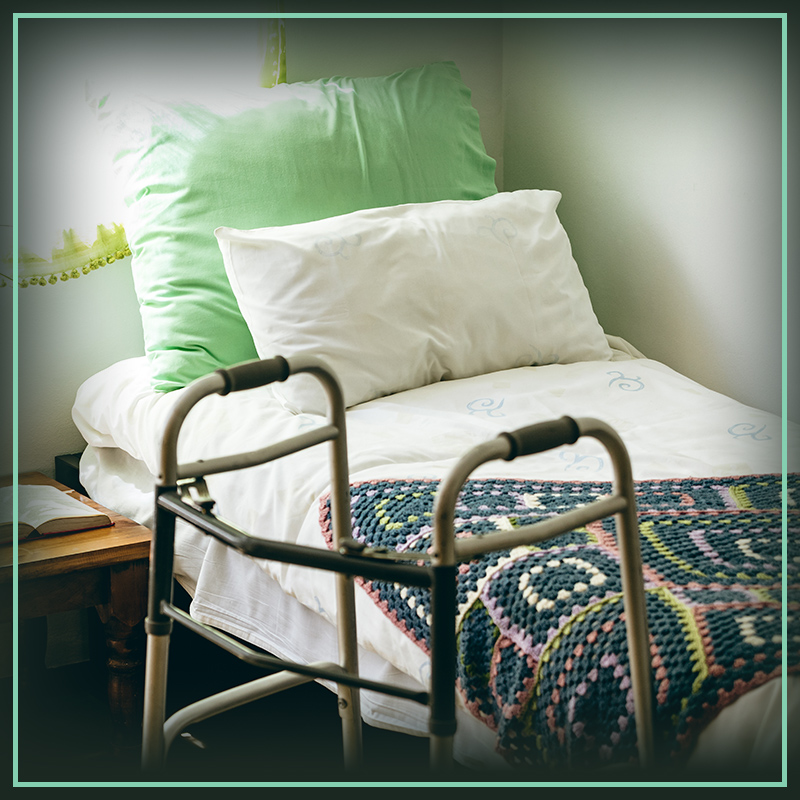
We have repeatedly gone up against many New Mexico nursing homes and are familiar with how to combat the strategies they use to try and escape accountability.

Types of Physical Abuse That Can Occur in Nursing Homes
Physical abuse in a nursing home may be perpetrated by facility staff members or other residents. In some cases, the abuse may be intentional, while in others, it may be an unintended consequence of other factors. Either way, the consequences can include bruises, burns, sprains, scarring, broken bones, and even death.
There are three major types of physical abuse a resident may experience in a nursing home:
- Active abuse. “Active abuse” is perhaps the most straightforward category: It is what you probably picture when you think about “physical abuse.” Active abuse is any deliberate action that is meant to inflict pain. Examples include punching, kicking, shoving, and squeezing.
- Abuse of restraints. Restraints are sometimes needed to keep a resident still for medical reasons. They should only ever be used for brief periods where they are absolutely necessary. The use of restraints can become abusive if they are employed punitively or as an instrument of convenience.
- Physical neglect. Nursing homes must provide their residents with sufficient food, clothing, and care, which includes a safe, clean living environment. Neglect can lead to residents not receiving the things they need to stay healthy, which is considered a form of abuse.
Common Forms of Physical Abuse
Common examples of physical abuse in nursing homes can include:
- Hitting: This involves striking a resident with an open or closed hand, which can result in physical injury, bruising, or pain.
- Kicking: Some caregivers may resort to kicking residents, which can lead to severe injuries, fractures, or internal damage.
- Pushing: Pushing residents forcefully can cause them to fall, resulting in injuries such as broken bones, sprains, or head injuries.
- Slapping: Slapping residents can cause physical harm, pain, and visible injuries like bruising or swelling.
- Striking with objects: Caregivers may use objects to hit or strike residents, which can cause serious injuries, fractures, or lacerations.
- Burning: Deliberate burning of residents with hot objects or substances can lead to severe burns, scarring, and long-term pain.
- Unnecessary restraints (physical or chemical): Some nursing home staff may use physical restraints (such as belts or ties) or chemical restraints (sedative medications) without a legitimate medical reason, which is considered abuse.
- Overmedication: Administering excessive medication or sedatives to control or subdue residents is a form of physical abuse.
- Force-Feeding: Forcing residents to eat or drink against their will, often leading to choking or physical harm, is a form of abuse.
- Deprivation of Food or Water: Withholding food or water as a form of punishment is a serious violation of residents' rights.
- Denial of Medication: Refusing to administer necessary medications can have severe physical consequences for residents.
- Neglect of Basic Hygiene: Failure to provide residents with proper hygiene care, such as bathing, grooming, and changing clothes, can result in physical discomfort and health issues.
- Intentional Injuries: Deliberate actions, such as burning or cutting residents, constitute extreme forms of physical abuse.
- Inadequate Medical Care: Failing to address residents' medical needs promptly or appropriately can result in physical deterioration and harm.
- Rough Transfers: Mishandling residents during transfers from beds to chairs or vice versa can lead to falls and injuries.
Common Causes of Physical Abuse in Nursing Homes
Sometimes, physical abuse is the result of malice. A facility staff member or another resident may simply wish to cause harm and target a vulnerable person.
Not all physical abuse in nursing homes is premeditated. Overworked staff members may become frustrated and resentful, leading to situations where they cause physical harm out of anger. Furthermore, if a facility is critically understaffed, physical neglect may be inevitable.
No matter the explanation, physical abuse, including neglect, is never justifiable. Our Albuquerque nursing home physical abuse attorneys can evaluate your loved one’s circumstances and review your legal options.
Signs of Physical Abuse in a Nursing Home
Your loved one may not be able or willing to tell you about any physical abuse you have endured. You must be vigilant about looking for signals that could indicate your loved one has been harmed or continues to be in danger.
Warning signs of nursing home physical abuse include:
- Unexplained bruises, welts, or lacerations: Look for unexplained injuries, especially in areas of the body that are not typically prone to accidental bumps or falls, such as the face, neck, or genitals.
- Fractures or broken bones: Residents who suddenly have multiple fractures or broken bones without a clear explanation may be experiencing physical abuse.
- Burns: Unexplained burns, particularly if they appear to be from hot water, cigarettes, or other sources, can be a sign of abuse.
- Bedsores: Neglect or abuse can lead to bedsores or pressure ulsers, which are painful and can be a sign of improper care.
- Restraining marks: Straps, ropes, or other physical restraints can leave visible marks on a resident's wrists or ankles.
- Scratches or abrasions: Signs of scratching, pinching, or other abrasive injuries may indicate abuse.
- Fear or withdrawal: A resident who becomes withdrawn, fearful, or anxious around specific staff members may be experiencing abuse.
- Agitation or aggression: Some residents may display aggressive behavior as a response to abuse or frustration with their situation.
- Changes in medication: Unexplained changes in a resident's medication, such as increased sedation or inappropriate use of drugs, can be a sign of abuse.
- Infections or unexplained illnesses: Frequent or severe infections can be a sign of neglect or inadequate care.
- Malnutrition: Unexplained weight loss may result from inadequate food intake and can be a sign of physical abuse.
- Poor hygiene: Neglect may manifest as a lack of assistance with personal hygiene, dirty or unchanged clothing, or unsanitary living conditions.
- Dehydration: Inadequate fluid intake can lead to dehydration, which may result from neglect in providing residents with sufficient water.
- Caregiver's refusal to allow visits: A member of the facility’s staff who refuses to let you be alone with your loved one
- Inconsistent explanations: If the staff offers inconsistent or implausible explanations for a resident's injuries or condition, it may indicate abuse.
What to Do If You Suspect Physical Abuse in a Nursing Home
Here are the actions you should consider:
- Document Your Concerns: Describe any signs of abuse you’ve noticed. Take photographs of injuries, bruises, cuts, or other physical evidence. Keep detailed notes of any changes in your loved one’s behavior, health, or condition, as well as the dates and times you observed these changes. This documentation will be vital in any future legal proceedings or investigations.
- Ask Direct Questions: If possible, speak with your loved one privately and ask open-ended questions about their well-being. Sometimes, victims of abuse may feel scared or intimidated to speak up in front of their abuser, so having a one-on-one conversation can encourage them to share their experiences. Be gentle and patient, as they may not be able to articulate everything at once.
- Report the Abuse to the Nursing Home Management: Once you have sufficient concerns, report the abuse to the nursing home management. Ask for a formal meeting to discuss your concerns and ask them to investigate the issue. Request written confirmation that they are looking into the matter. However, remember that some staff members could be complicit in the abuse, so it’s important to stay vigilant even after reporting.
- Contact the Appropriate Authorities: If you believe your loved one is in direct danger, contact the authorities immediately. You can reach out to:
Adult Protective Services (APS) in New Mexico, which investigates allegations of elder abuse.
Local law enforcement if you believe the abuse is criminal or your loved one is in imminent danger.
State licensing agencies that oversee nursing home operations, such as the New Mexico Department of Health, which handles complaints about nursing home care.
- Seek Medical Attention: Ensure your loved one receives prompt medical care if injured. A doctor can assess their injuries, document them, and provide necessary treatments. Medical records will serve as crucial evidence if you choose to pursue legal action.
- Contact an Experienced Nursing Home Abuse Lawyer: If you suspect physical abuse, it’s essential to consult with an attorney who specializes in nursing home abuse cases. A lawyer can help you file a complaint, collect evidence, and pursue legal action against the abusers or negligent parties. They can also advise you on how to protect your loved one’s rights and interests during the investigation.
- Consider Transferring Your Loved One: If you believe that the situation is unsafe, consider transferring your loved one to another facility or moving them to a safe environment temporarily. This will ensure that they are no longer at risk of further harm while the investigation is underway.
- Follow Up on the Investigation: Once you’ve reported the abuse, follow up with the authorities and nursing home management to ensure that they are taking the necessary steps. Be persistent in asking for updates on the progress of the investigation and any measures being taken to address the abuse.
Who Is Responsible for Physical Abuse in Nursing Homes?
Nursing home staff members, medical professionals, visitors, and other parties are generally liable for any physical abuse they perpetrate. Additionally, however, nursing homes must provide a safe, healthy environment and quality care to their residents. This includes implementing reasonable efforts to proactively prevent and stop any type of abuse. Therefore, facilities can also become liable for physical abuse perpetrated by staff or other residents if they fail to facilitate a safe environment or sufficiently address reports of misconduct. Understaffing a facility, overworking employees, undertraining staff, and ignoring reports of mistreatment are all actions that can potentially make a nursing home liable for physical abuse.
Available Damages in Physical Abuse Claim
If there is evidence your loved one has been physically abused or neglected in a nursing home, but you are not sure what to do next, our team can provide tailored guidance and legal support. Our first priority is getting your loved one to safety. Then, we will help you report the abuse to the appropriate authorities, gather documentation, and get to work on your case against the negligent nursing home. Your loved one and your family may be entitled to compensation for damages, and we will always attempt to maximize what you recover.
Our Albuquerque nursing home physical abuse lawyers will work to hold the negligent facility accountable and get you compensation for:
- Past, current, and future medical bills
- Pain and suffering
- Loss of consortium
- Loss of enjoyment of life
Contact Our Nursing Home Physical Abuse Attorney in Albuquerque Today
If you believe a loved one has been the victim of physical abuse in a nursing home, it’s essential to act quickly. The sooner you contact an experienced attorney, the better your chances of preserving critical evidence and filing a timely claim.
Our Albuquerque nursing home physical abuse lawyers are ready to help you pursue justice for your loved one. We offer a free consultation to discuss the details of your claim and determine the best course of action. We are committed to fighting for the rights of nursing home residents and ensuring that negligent or abusive caregivers are held accountable.
We look forward to helping your family get justice. Discuss your loved one’s case with our our Albuquerque nursing home physical abuse lawyers by calling (505) 295-2245 or contacting us online.
What Sets Us Apart
-
You Deserve Maximum CompensationOur team is committed to standing up for the injured in New Mexico. When you or your loved one have been harmed because of someone else's negligence, you don't just deserve compensation, you deserve justice.
-
You Deserve an Experienced Legal TeamOur attorneys have handled thousands of cases and are true legal innovators when it comes to pursuing cases. We have the tools, resources, and knowledge to properly obtain maximum compensation on your behalf.
-
You Deserve New Mexico AdvocatesAt Harvey, Foote & Baker Law Firm we are New Mexico-based attorneys who understand how scary and difficult this time can be. When you work with us, we can guarantee that you, your family, and your case are of the highest priority to us.
-
You Deserve Dedicated RepresentationSince 2005 our team has been solely dedicated to protecting the rights of those injured and mistreated in nursing homes throughout the state. We know and understand how the system works and how to obtain the best possible outcome on your behalf.

Real Clients. Real Stories.
Hear From Past Clients Who Have Worked With Harvey, Foote & Baker Law Firm
-
There are no words to express my appreciation for everyone at the Harvey, Foote & Baker Law Firm. You gave my mom her dignity back and made sure she wasn't just a number. Of course, we would rather her still be with us but you enabled her to leave a legacy to her grandchildren. You helped us through the worst time of our lives and got justice for my mom. I always knew that I had the best team on my side!!Carla S.
-
Our lives were changed by tragedy in December 2012, but the team at Harvey, Foote & Baker were a sight for sore eyes. We were lucky to have such smart and talented attorneys and staff who fought hard for us. I will never forget the professionalism, care, and sincere attention you always gave us. You've made a huge difference in my life, and I am grateful to all of you!Lydia S.
-
The team at Harvey, Foote & Baker is wonderful and compassionate. They worked hard to help us after losing our father due to neglect of care. They continue to fight for our family, and we appreciate them so much. Highly recommend.Michael C.
-
Harvey, Foote & Baker Law Firm is the team you want looking out for your best interests. You can rest assured knowing they are on your side. The many obstacles facing your case will be met by their dedicated team of professionals.Norberto G.
-
“Having the BEST attorneys on our side brought about an even better than expected outcome. Thank you, Dusti, Jennifer, and all of your amazing staff!!”Mara H.
-
“We were astounded by how thorough you were, delightful towards us, but tough against the other side. We were shocked that you were able to recover so much money for our family.”Cindy
-
“Ms. Dusti Harvey and Ms. Jennifer Foote and their staff were an AMAZING firm to work with!!! Their staff kept me in the loop through the entire process.”Tammi L.
-
“Dusty and her crew were there to pick up the pieces and made sure that they kept us informed from the smallest thing to the biggest. I will forever be grateful to you.”Hermelinda P.

